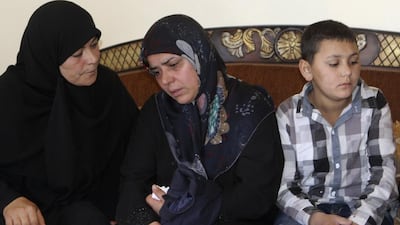BEIRUT // The beheading of two soldiers by ISIL militants has sparked an outpouring of anger in Lebanon, placing even more strain on the country’s brittle sectarian ties.
Lebanon’s prime minister, Tammam Salam, called for calm after families of at least 22 soldiers and policemen still held by extremists in Syria blocked motorways, brandished weapons and threatened to harm Syrian refugees.
They were angered by photos released on Saturday that showed the beheading of one of the captured soldiers, two weeks after another suffered the same fate.
The incident highlights how the rise of ISIL further threatens the stability of Lebanon, which is already struggling to cope with the overspill from the Syrian civil war.
More than a million refugees have fled from Syria to Lebanon since the war started three years ago, placing huge strain on the country of just 4.5 million people.
The fighting in Syria, which has killed 190,000 people, has upset Lebanon’s delicate sectarian balance, triggering bouts of fighting that have included rocket and bomb attacks.
“Resorting to shutting down roads, and stopping movement in the country will not return to us our soldiers. Our battle is with our terrorist enemy, not against each other,” Mr Salam said in a televised address late on Sunday.
Urging Lebanese to trust government efforts to negotiate the soldiers’ release, the premier warned that “the discord that the terrorists seek ... provides an entry for the destruction of our national harmony”.
Militants from ISIL and Al Qaeda’s Syria affiliate, Jabhat Al Nusra, captured the soldiers during fighting when they took over the Lebanese border town of Arsal for several days last month.
The solider beheaded on Saturday was identified as Abbas Medlej, a Shiite resident of Baalbek in eastern Lebanon. Late last month, a Sunni, Ali Al Sayyed, was the first to be decapitated among the detained troops and policemen, who are made up of Muslims and Christians.
Local media reported on Monday that the interior minister was coordinating with officials from Hizbollah, Lebanon’s powerful Shiite movement, to help ease tensions.
“We are in open communication with the leadership of Hizbollah, and in all directions, to rein in sectarian tension and anger on the streets,” said Nouhad Machnouk.
Many in Lebanon hold deep reservations over Hizbollah’s decision to fight against Syria’s rebels alongside the forces of president Bashar Al Assad. Hizbollah’s fighters also have been battling Sunnis from Lebanon who went to Syria to join the rebel’s fight against Mr Al Assad.
As ISIL’s grip over swathes of territory in Iraq and Syria has strengthened in recent months, there are fears that the group may try to gain a foothold inside Lebanon.
“It seems like Daash [ISIL] has placed itself where it can capitalise on Sunni grievances in the region, particularly Lebanon, Syria and Iraq,” said Imad Salamey, political-science professor at the Lebanese American University.
Anger and disenfranchisement has soared in some of Lebanon’s Sunni communities, particularly in the poorer north, where they feel neglected by the government in Beirut and where poverty and a crisis among their community’s leaders has added to their problems.
ISIL has sought to capitalise on the same sort of resentments that the group exploited in its lighting advance across Iraq in June, Mr Salamey said. There, Sunni communities largely felt marginalised by the Shiite-led government in Baghdad.
“In the absence of a powerful, moderate Sunni leadership in Lebanon and the failure of the moderate revolutionary forces in Syria, all this is playing into the hands of radical groups such as Daash.”
In early August, ISIL and Al Nusra besieged Arsal, a town that has become known for its lawlessness because of the Syrian war.
That fighting was the most serious in Lebanon since the start of the conflict, killing dozens of Lebanese soldiers and police as well as dozens of civilians.
It was triggered when Lebanese authorities arrested Imad Ahmad Jomaa, a Nusra commander who then joined ISIL.
The militants demand that Lebanese authorities release a number of jailed extremists.
In a video message released last week by Al Nusra, the militants warned Sunnis in Lebanon that they would “pay the price” for not supporting them.
The video showed what the group alleged were Lebanese soldiers captured in Arsal.
* Additional reporting by the Associated Press

